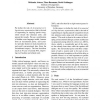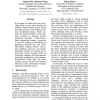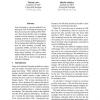COLING
2008
14 years 1 months ago
2008
COLING
2008
14 years 1 months ago
2008
We define the task of incremental or 0lag utterance segmentation, that is, the task of segmenting an ongoing speech recognition stream into utterance units, and present first resu...
COLING
2008
14 years 1 months ago
2008
Phrasal segmentation models define a mapping from the words of a sentence to sequences of translatable phrases. We discuss the estimation of these models from large quantities of ...
COLING
2008
14 years 1 months ago
2008
We propose a spatio-temporal markup for the annotation of motion predicates in text, informed by a lexical semantic classification of these verbs. We incorporate this classificati...
COLING
2008
14 years 1 months ago
2008
We propose a hybrid generative/discriminative framework for semantic parsing which combines the hidden vector state (HVS) model and the hidden Markov support vector machines (HMSV...
COLING
2008
14 years 1 months ago
2008
COLING
2008
14 years 1 months ago
2008
This paper explores the relationship between various measures of unsupervised part-of-speech tag induction and the performance of both supervised and unsupervised parsing models t...
COLING
2008
14 years 1 months ago
2008
We propose an approach to natural language inference based on a model of natural logic, which identifies valid inferences by their lexical and syntactic features, without full sem...
COLING
2008
14 years 1 months ago
2008
Active learning is a proven method for reducing the cost of creating the training sets that are necessary for statistical NLP. However, there has been little work on stopping crit...
COLING
2008
14 years 1 months ago
2008
We describe and evaluate a new method of automatic seed word selection for unsupervised sentiment classification of product reviews in Chinese. The whole method is unsupervised an...



